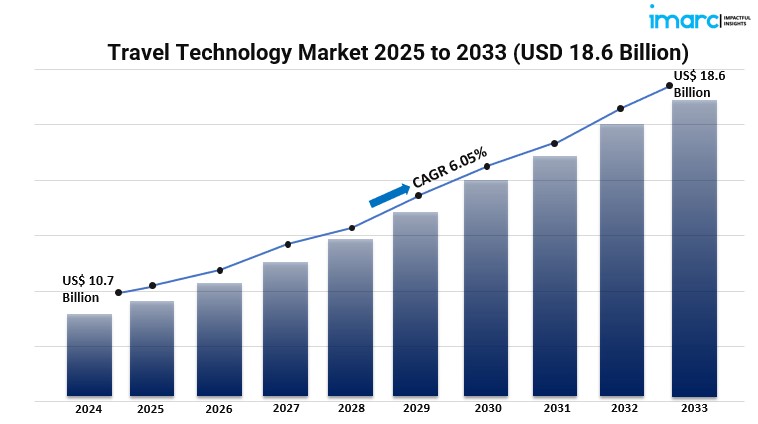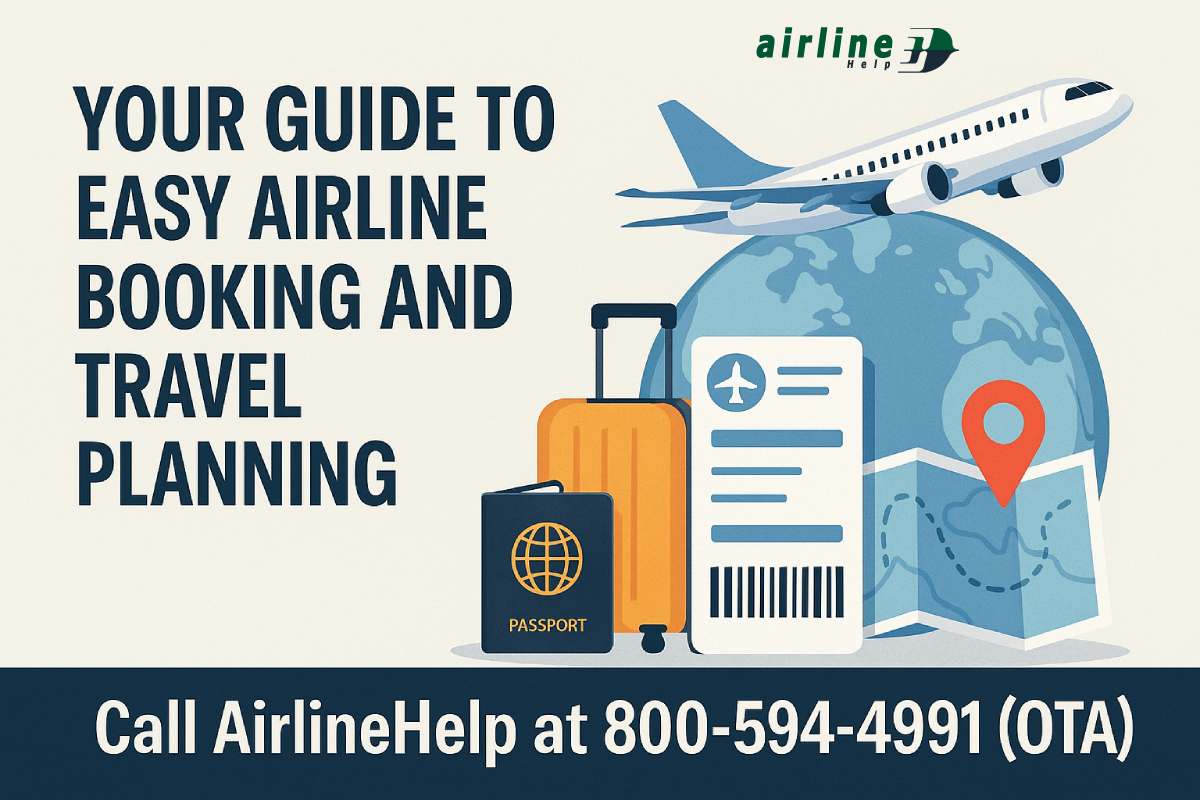
The global travel technology market is experiencing significant growth, reaching USD 10.7 billion in 2024 and projected to expand to USD 18.6 billion by 2033, with a CAGR of 6.05% during 2025–2033. This surge is fueled by the increasing demand for personalized travel experiences, the integration of mobile technology, and advancements in AI and machine learning. These innovations are revolutionizing service delivery, enhancing traveler experiences through customized and efficient solutions.
Study Assumption Years
- Base Year: 2024
- Historical Years: 2019–2024
- Forecast Years: 2025–2033
Travel Technology Market Key Takeaways
- Market Size & Growth: The market is valued at USD 10.7 billion in 2024 and is expected to reach USD 18.6 billion by 2033, growing at a CAGR of 6.05% during 2025–2033.
- Regional Performance: North America leads in market size and innovation, while Asia Pacific shows rapid growth due to digital adoption and a booming travel sector.
- Product Segmentation: The market is segmented into Airline & Hospitality IT Solutions and Global Distribution System (GDS), with GDS dominating due to its extensive network connecting travel suppliers with distribution channels.
- Application Segmentation: Applications span across the Travel Industry, Tourism Industry, and Hospitality Industry, enhancing operations through booking engines, CRM systems, and data analytics.
- Key Trends: The industry is witnessing a shift towards mobile-first solutions and the use of big data for personalized travel offerings. There’s also a rise in sustainable and eco-friendly travel technologies.
- Technological Advancements: Rapid advancements in AI, machine learning, blockchain, and IoT are pivotal in creating more personalized, efficient, and secure travel experiences.
- Competitive Landscape: The market features a mix of established players and emerging startups focusing on innovation and strategic partnerships. Competition is intense, with companies striving to offer unique solutions and expand their market presence.
What Are the Key Factors Fueling the Growth of the Travel Technology Market?
Expansion of Online Booking Platforms
Let’s be real: online travel agencies are everywhere now. Booking flights, hotels, or car rentals has never been easier—people expect to do it all from their phone, often in the middle of their workday. These platforms use advanced tech like AI and machine learning to serve up personalized recommendations, which keeps customers engaged and, frankly, coming back for more. Mobile integration is huge—if your service isn’t seamless on a phone, you’re losing business.
Increasing Internet Penetration and Mobile Usage
The internet is basically omnipresent, and mobile devices are glued to everyone’s hands. This has opened the floodgates for travel companies to reach customers on the go, 24/7. Travelers research, compare, and book—sometimes all within a few minutes—directly from their mobile devices. The companies that make this process effortless are the ones winning market share.
Rise in Sustainable and Responsible Travel
Sustainability isn’t just lip service anymore. More travelers want to minimize their footprint, and businesses are responding with new tech—think carbon offset calculators, eco-certified hotels, and greener booking options. The push for sustainability is driving real innovation, and companies that get ahead of this trend are capturing a growing, loyal customer base.
Market Segmentation
By Product Type
- Airline & Hospitality IT Solutions: These solutions encompass software and systems designed to streamline operations, enhance customer service, and improve efficiency in airlines and hospitality businesses.
- Global Distribution System (GDS): GDS platforms serve as centralized networks that facilitate transactions between travel service providers and travel agencies, offering real-time availability and pricing information.
By Application
- Travel Industry: Incorporates technologies that assist travel agencies and tour operators in managing bookings, itineraries, and customer relationships.
- Tourism Industry: Encompasses tools that enhance the promotion and management of tourist destinations, attractions, and experiences.
- Hospitality Industry: Includes systems that aid hotels and other lodging establishments in reservations, guest services, and property management.
By Region
- North America (United States, Canada)
- Asia Pacific (China, Japan, India, South Korea, Australia, Indonesia, Others)
- Europe (Germany, France, United Kingdom, Italy, Spain, Russia, Others)
- Latin America (Brazil, Mexico, Others)
- Middle East and Africa
Which Region Leads the Travel Technology Market?
North America leads the pack, thanks to its heavy hitters in travel tech and a culture that’s quick to adopt new solutions. The region’s infrastructure and appetite for innovation make it the go-to market for cutting-edge travel tech.
What Are the Latest Developments in the Travel Technology Market?
AI and machine learning are everywhere, powering smarter, more tailored travel experiences. Blockchain is making a splash too, promising increased booking security and transparency. The industry is clearly shifting to mobile-first strategies and using big data to personalize offerings. Sustainable solutions are on the rise—consumers expect it, and companies are delivering.
Who Are the Key Players in the Travel Technology Market?
Amadeus IT Group SA, CRS Technologies India Pvt Ltd, Lemax, mTrip, Navitaire LLC, Qtech Software Private Limited, Sabre Corporation, Tramada Systems Pty Ltd, Travelport International Limited, etc.
Frequently Asked Questions
Q1: What is the projected growth rate of the travel technology market?
The market is expected to grow at a CAGR of 6.05% from 2025 to 2033.
Q2: Which region currently dominates the travel technology market?
North America leads the market, attributed to its advanced technological infrastructure and high adoption rates.
Q3: What are the main product segments in the travel technology market?
The primary segments are Airline & Hospitality IT Solutions and Global Distribution System (GDS).
Q4: How is AI influencing the travel technology industry?
AI enhances personalized travel experiences, optimizes operations, and provides instant customer service through chatbots and virtual assistants.
Q5: What role does sustainability play in the travel technology market?
There’s a growing emphasis on sustainable and eco-friendly travel technologies, catering to environmentally conscious consumers.
Q6: How are mobile technologies impacting the travel industry?
Mobile technologies facilitate on-the-go bookings, real-time updates, and personalized travel experiences, enhancing customer satisfaction.
If you require any specific information that is not currently covered within the scope of the report, we will provide the same as a part of the customization.
About Us:
IMARC Group is a global management consulting firm that helps the world’s most changemakers to create a lasting impact. The company provides a comprehensive suite of market entry and expansion services. IMARC offerings include thorough market assessment, considerations studies, company incorporation assistance, factory setup support, regulatory approvals and licensing navigation, branding, marketing and sales strategies, competitive landscape and benchmarking analyzes, pricing and cost research, and procurement research.







